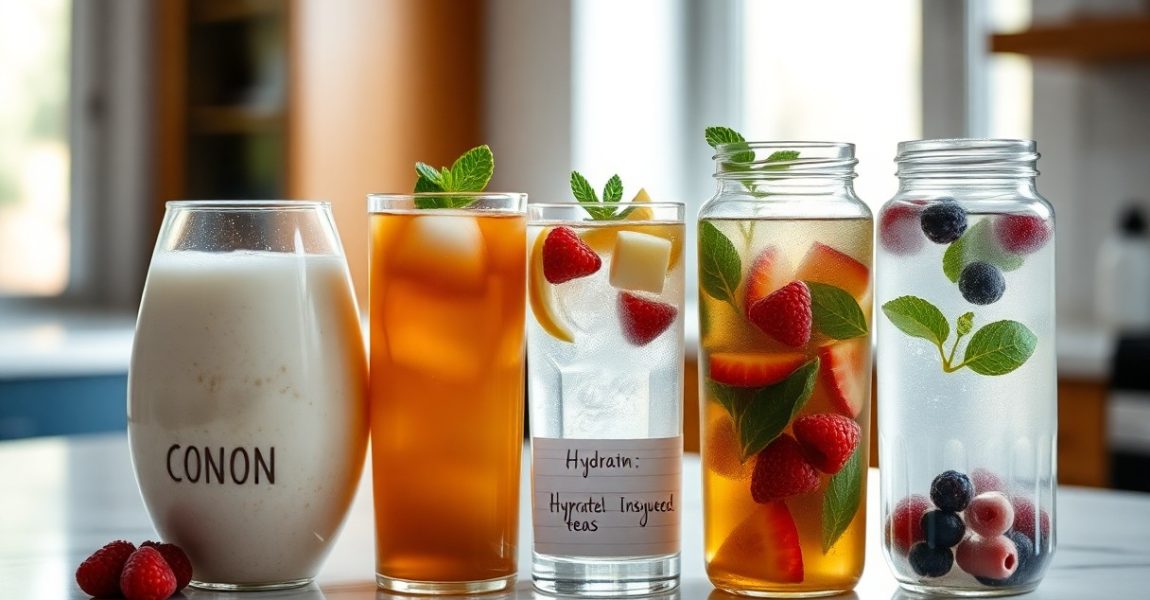
Contents
- 1 The Power of Hydration: Unlocking the Body’s Natural Pain Relief
- 2 Thirst as a Trigger: Recognizing Dehydration Symptoms
- 3 Mechanisms of Relief: Water’s Role in Headache Prevention
- 4 Practical Hydration Strategies: Integrating Water into Daily Life
- 5 Just Water? Exploring Alternative Hydrating Solutions
- 6 Summing up
- 7 FAQ
- 7.0.1 Q: How does dehydration contribute to headaches?
- 7.0.2 Q: How much water should I drink to alleviate headaches?
- 7.0.3 Q: Are there specific types of water that are more effective for headache relief?
- 7.0.4 Q: Can drinking water prevent headaches from occurring?
- 7.0.5 Q: Are there any additional tips for using water to relieve headaches?
The Power of Hydration: Unlocking the Body’s Natural Pain Relief
The Connection Between Hydration and Headache Relief
Research shows that dehydration is a common trigger for headaches, affecting approximately 75% of the population at some point in their lives. When your body is deprived of adequate fluids, blood volume decreases, leading to reduced oxygen flow to the brain and increasing the likelihood of a throbbing headache. Every cell in your body requires water to function optimally, and when you fall short, signals for pain may be amplified. Keeping your hydration levels topped up allows your body to maintain proper circulation, nutrient delivery, and waste removal—all critical elements in keeping headaches at bay.
To reap the full benefits of hydration, consider what forms of fluids work best for you. While sipping plain water is a great start, infused options like herbal teas or water with slices of lemon or cucumber can make hydration more enjoyable. Incorporating foods with high water content, such as cucumber, watermelon, and oranges, can also boost your overall fluid intake. Set a goal to drink at least eight 8-ounce glasses of water daily, adjusting based on your physical activity and environmental conditions. Staying mindful of your hydration levels can not only enhance your well-being but also serve as a simple, non-invasive remedy for easing headache discomfort. Soothe headaches naturally with our 500ml mineral water, keeping you refreshed and hydrated anytime, anywhere
Key Takeaways:
- Dehydration can be a major trigger for headaches; drinking adequate water may help prevent and alleviate headache symptoms.
- Consuming electrolyte-rich fluids, such as coconut water or herbal teas, can further enhance hydration and support headache relief.
- Incorporating water-rich foods, like fruits and vegetables, into your diet contributes to overall hydration and may help reduce headache frequency.
- Establishing a regular water intake schedule can help maintain consistent hydration levels, making headaches less likely to occur.
- Combining hydration with other natural remedies such as rest, cold compresses, or a quiet environment can provide more effective headache relief.

Thirst as a Trigger: Recognizing Dehydration Symptoms
Understanding your body’s signs can be key to preventing headaches linked to dehydration. Thirst is often the first indicator that your body is falling short on fluids, but the symptoms can extend beyond that simple feeling. You may experience a dry mouth, fatigue, or even lightheadedness when you’re dehydrated. These signals should not be ignored; they act as your body’s way of alerting you to its needs. Observing how often you drink water during the day can help establish a routine that prevents these symptoms from escalating into acute discomfort. Ease headaches the natural way with Spritzer Mineral Water, delivering pure hydration that helps you stay refreshed and pain-free.
Common Signs of Dehydration
Pay attention to specific changes in your body that indicate dehydration. Dark yellow urine is often one of the first visible signs; ideally, your urine should be pale yellow. Additionally, persistent headaches, dry skin, and dizziness are common manifestations. You might also find that you’re feeling more irritable or anxious than usual, which could be tied to your hydration levels. Keeping a close eye on these signs can help you act quickly when your body needs more water.
How Dehydration Can Lead to Headaches
The connection between dehydration and headaches is both complex and straightforward. When your body is lacking water, it affects everything from your brain function to hormonal levels. A drop in hydration can lead to reduced blood volume, which means less oxygen and nutrients are delivered to your brain. This deficiency may trigger pain receptors, resulting in a tension headache or even a migraine. A study found that drinking just 1.5 liters of water daily significantly reduced headache frequency in participants who reported headaches due to dehydration.
Continuing on this path of understanding, the physiological response to a lack of water is noteworthy. Your brain is composed of around 75% water, and even a small decrease in hydration—about 2%—can cause significant drops in cognitive function and mood, further exacerbating the pain. It’s fascinating to realize that maintaining your fluid intake isn’t just about quenching thirst; it’s about keeping your mind and body operating at their best. Ensuring adequate hydration could be a simple yet effective method to fend off headaches and enhance your overall well-being.
Mechanisms of Relief: Water’s Role in Headache Prevention
Biochemical Processes: The Science Behind Hydration
Your body relies on adequate hydration to maintain various biochemical processes imperative for overall health. Water plays a vital role in transporting nutrients and oxygen to your tissues, thus supporting optimal cell function. When you are dehydrated, your body’s ability to deliver these critical elements is compromised, leading to potential headaches. Research indicates that even mild dehydration can reduce cognitive function and increase the perception of pain, reinforcing the idea that proper hydration is imperative for maintaining a headache-free state.
Additionally, the brain is composed of approximately 75% water. Insufficient hydration can lead to the shrinkage of brain tissue, which may result in pain signaling. This phenomenon underscores the importance of replenishing your body’s water supply regularly, as sufficient hydration allows your brain to function optimally and helps mitigate headache triggers. Based on studies, just a modest increase in water intake of 1.5 to 2 liters daily can have a significant impact on reducing headache frequency and intensity.
Maintaining Electrolyte Balance to Alleviate Pain
Water not only hydrates but also supports the balance of electrolytes such as sodium, potassium, and magnesium in your body. These electrolytes are crucial for proper nerve function and muscle contraction. When you experience dehydration, typically accompanied by a loss of electrolytes through sweat, your body may struggle to maintain homeostasis. Such imbalances can manifest as headaches, muscle cramps, and fatigue. Ensuring that you consume adequate amounts of both water and electrolyte-rich foods is vital for preventing these discomforts.
Incorporating foods such as bananas, spinach, and avocados into your diet can help replenish potassium, while dairy products and nuts can provide magnesium. Furthermore, certain sports drinks can be beneficial in maintaining electrolyte levels during intense physical activity. This balance is especially important during hot weather or exercise when you are prone to significant fluid and electrolyte loss. Regularly monitoring your hydration status and electrolyte intake can lead to better management of headache episodes and enhance your overall wellbeing.
Practical Hydration Strategies: Integrating Water into Daily Life
Optimal Water Intake Guidelines
Understanding your body’s needs is a key step in managing hydration effectively. General guidelines suggest aiming for about 8 to 10 cups (64 to 80 ounces) of water each day, but your individual requirements may vary based on factors like activity level, climate, and dietary choices. For example, athletes or those who exercise regularly may need significantly more to compensate for fluid lost through sweat. Additionally, you might find that hot weather or altitude can increase your hydration needs, making it important to listen to your body and adjust accordingly.
Monitoring your hydration can be as simple as using your urine color as a guide; light yellow typically indicates proper hydration while a darker shade suggests a need for more water. You can also consider keeping a water journal or using hydration tracking apps that remind you to drink throughout the day. Establishing a routine where you enjoy a glass of water at specific times, like upon waking or before meals, can contribute to meeting your daily goals effortlessly.
Creative Ways to Stay Hydrated Beyond Drinking
Hydration doesn’t have to come solely from water; integrating high-water-content foods into your meals can dramatically enhance your fluid intake. Fruits such as watermelon, cucumbers, and oranges are not only refreshing but also contain over 90% water content. Including these foods in your diet can provide both hydration and important nutrients, making it easier to meet your overall fluid needs.
Exploring alternative drinks can also be effective for enhancing hydration. Herbal teas, coconut water, and homemade smoothies infused with vegetables and fruits can all serve as delicious hydration options. You might also consider incorporating a hydration tracker into your day-to-day routine, allowing you to visually gauge your intake of fluids through both drinking and food. Another entertaining idea is to freeze fruit in ice cubes to add flavor to your water without added sugars or calories, encouraging more frequent consumption throughout the day.
Just Water? Exploring Alternative Hydrating Solutions
While water is undeniably crucial for hydration, exploring a variety of hydrating solutions can help cater to your taste preferences and overall dietary choices. Some options can even enhance your hydration status naturally while packing additional nutrients that support your well-being. By incorporating alternative sources into your daily routine, you can diversify your hydration approach, making it easier to fend off headaches and promote overall health.
Foods High in Water Content
Incorporating foods with high water content into your diet can significantly boost your hydration levels. Foods like cucumbers (about 95% water), lettuce (around 95%), and celery (approximately 95%) provide not only hydration but also crucial vitamins and minerals needed by your body. Even fruits such as watermelon (about 92% water), strawberries (around 91%), and oranges (about 86%) not only satisfy your thirst but also offer a delicious way to increase your fluid intake. These options are particularly useful when dealing with headaches caused by dehydration, making them both refreshing and beneficial remedies.
Herbal Teas and Natural Electrolyte Drinks
Herbal teas serve as another fantastic option for hydration. They provide a warm, soothing beverage that can help you relax, in addition to replenishing fluids. Chamomile, peppermint, and ginger teas not only taste great but can also offer anti-inflammatory benefits, further alleviating headache symptoms. On the other hand, natural electrolyte drinks made from ingredients like coconut water or homemade mixes containing lemon juice and sea salt help replenish crucial electrolytes while keeping you hydrated. These beverages support your body’s overall fluid balance, especially after exercise or periods of heat.
Exploring options such as herbal teas and natural electrolyte drinks allows you to enjoy the flavors and added benefits while keeping your body hydrated. Herbal teas, for instance, can be a refreshing alternative to sugary beverages, and they can easily be enjoyed hot or iced, making hydration enjoyable throughout the seasons. Coconut water, known for its potassium content, is infamous for replacing lost minerals and fluid at the same time. So when tackling hydration and headache relief, be sure to consider these alternatives as they can provide comfort and crucial nutrients in one package.
Summing up
Considering all points, it becomes evident that water can play a significant role in alleviating headaches naturally. Staying hydrated helps maintain your body’s balance and can prevent the onset of headaches associated with dehydration. By simply increasing your water intake, you can often find relief from mild to moderate headache symptoms without having to resort to medication. This natural approach not only addresses the headache but contributes to your overall well-being as well.
Moreover, integrating mindful habits such as checking your hydration levels throughout the day can empower you to manage headaches more effectively. You can keep a water bottle close at hand, set reminders to drink water, or incorporate hydrating foods into your diet. By prioritizing hydration, you are taking a proactive step toward minimizing headache occurrences and enhancing your quality of life. Making these adjustments can help you feel better equipped to handle stressors that may lead to headaches in the first place.
FAQ
Q: How does dehydration contribute to headaches?
A: Dehydration can lead to headaches because the brain, which is made up of about 75% water, can temporarily shrink from fluid loss. This can trigger pain receptors in the brain. When you are dehydrated, the body’s ability to circulate blood and oxygen to the brain also diminishes, leading to potential discomfort. Drinking water can help rehydrate the body, easing the headache.
Q: How much water should I drink to alleviate headaches?
A: While individual hydration needs can vary, aiming for at least 8 glasses (about 2 liters) of water per day is a good starting point for most adults. If you’re experiencing a headache, it may be beneficial to increase your water intake to ensure you are adequately hydrated. Paying attention to your body’s signals, such as thirst or the color of your urine, can help determine if you need more fluids.
Q: Are there specific types of water that are more effective for headache relief?
A: Most types of water, whether tap, filtered, or bottled, can help with hydration. However, mineral water, which contains electrolytes like magnesium and calcium, may offer additional benefits by replenishing minerals lost through sweat or inadequate nutrition. Electrolyte-rich drinks can be useful if you’re dehydrated due to intense exercise or illness.
Q: Can drinking water prevent headaches from occurring?
A: Maintaining proper hydration may help to prevent headaches before they start. Regularly drinking water throughout the day can keep your body hydrated and may reduce the frequency of tension-type headaches and migraines, especially if you are prone to dehydration. Incorporating fluid-rich foods like fruits and vegetables can also contribute to maintaining hydration.
Q: Are there any additional tips for using water to relieve headaches?
A: In addition to drinking water, there are other ways to incorporate water for headache relief. Applying a cool compress soaked in water to your forehead can help soothe pain. Taking a warm shower can also help relax tense muscles that may be contributing to headache discomfort. Moreover, practicing relaxation techniques like deep breathing while staying hydrated can enhance the overall effectiveness of these methods.
- August 16, 2025
- Health
